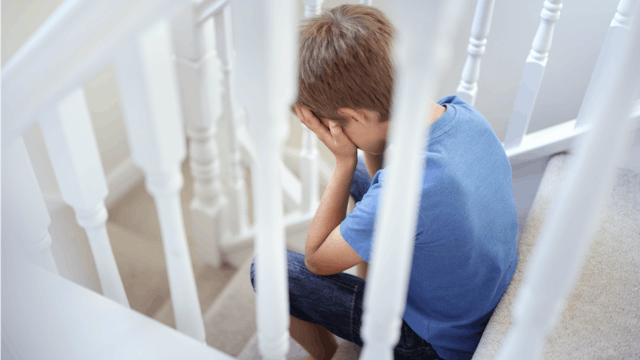What It's Like To Watch Your Anxiety Develop In Your Child

My anxiety is functional. I am hyper-organized, I am prepared for anything, and I am typically 10 steps ahead of reality. My mind also never stops. I over-analyze every conversation. I have certain fears that are irrational but very real to me.
My anxiety has led to me having success academically and professionally, but struggling socially. In high school, I became flustered and suffered from verbal diarrhea. Even in my 30s, when I run into some of the “high school in-crowd,” I still revert to a babbling idiot, quickly followed by analyzing every awkward part of the conversation.
Watching my anxiety be passed on to my son is heartbreaking. Devastating even seems like a too trivial description. My son is sweet, kind, thoughtful, and painfully intelligent. He is a beautiful person. I look at him and I am constantly in awe of who he is becoming. We have moments of conflict only because we have such a similar mindset.
He was a hard baby. He was my first, he was premature, he was sick, he never slept, he barely ate, and I had no idea what I was doing. Without his daddy, I would have been lost. My husband has learned to be patient through my anxiety, and the birth of our son solidified his role in my ability to cope.
My son was 4 years old when it started. He started questioning us at bedtime. “What are you going to do?” and “Where are you going?” was the beginning. One night we were outside feeding the chickens after his bedtime when we heard screaming. Hysterical screaming. Our son was frantically running from the house to our barn in his footy pajamas while screaming for us. He was irrational, difficult to calm, and generally overwhelmed.
This scene lead to a flashback from my childhood. I remember being very young, maybe 1st grade, and waking up to the crying of my younger brother. I tried to comfort him, to no avail, and went upstairs to find my parents. I couldn’t. They weren’t there. Panic set in. I became convinced that my parents were dead and hidden under the bed. I couldn’t bring myself to look so I did the most logical thing I could for a 6-year old, I called my best friend’s house. It was late, but her mom answered. She heard my fear and worked to comfort me. She told me she was on her way to my house. Then the door opened. My parents walked in completely oblivious to my ordeal. My mom took the phone and politely ended the conversation. I was promptly put to bed and my brother was tended to.
My parents had wanted to take a moment together. Exactly what my husband and I had been doing 24 years later. I looked into my son’s eyes and saw the wild and rapid thought process I had experienced at his age. I understood his fear and attempted to comfort him. For him, comfort took time. He needed multiple rounds of “we are here” and “you are safe.” He finally fell asleep from utter exhaustion.
From that night on, his anxiety became part of our bedtime routine. We would put him to bed, he would question us endlessly, and then he would run down the stairs in a panic about our whereabouts and safety.
My son’s anxiety pushed my own to its limits. I could feel my anxiety levels increase at bedtime and I would wait downstairs for his small and panicked self to run down those stairs. I felt edgy. I did my best to be supportive through it, but my own anxiety would win at times and my husband would need to take over.
I felt I was failing my son as his mother. Not only was I unable to provide him a fix to his issues with anxiety but I was the reason he was inflicted in the first place. I did this to him. I have given this to him. I could not make this go away. I had caused an unimaginable amount of hurt to my sweet boy. My anxiety fed my feelings of failure and inadequacy.
My mind quickly flashed to his future. Worries about his social abilities. Worries about his internal feelings of dread. Worries about worries about worries. Anxiety really is a vicious cycle.
Managing my own anxiety is difficult. Learning to manage my son’s anxiety at the same time can feel impossible. The best I can do right now is provide him with acknowledgment of his feelings and help him develop coping strategies that work for him. Of course, I constantly reevaluate this plan and how I am clearly screwing my kid up. But that’s anxiety in a nutshell.
This article was originally published on